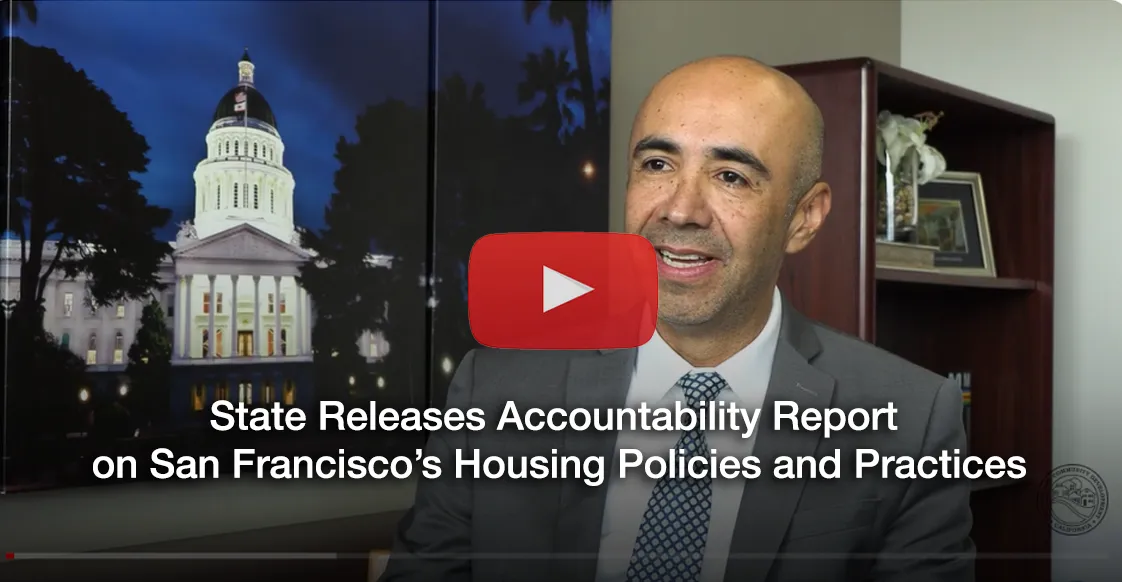State Releases Accountability Report on San Francisco’s Housing Policies and Practices
First-of-its-kind review finds San Francisco practices are out of compliance with state housing laws and negatively impact development – report sets course to remove barriers to housing production and increase transparency
October 25, 2023

San Francisco Housing Policy and Practice Review
Sacramento, CA
Today, Governor Gavin Newsom announced the release of the San Francisco Housing Policy and Practice Review, a comprehensive analysis of the patterns that created decades of costly building delays in San Francisco.
Why it’s important: San Francisco has the longest timelines and some of the highest procedural hurdles in the state for advancing housing projects to construction. These delays, combined with some of the highest housing construction costs in California, create a barrier to addressing the community’s unmet housing needs.
If San Francisco’s current rate of housing approvals and construction continues, the City will miss its housing production goal of over 82,000 new homes by 2031 that is necessary to address affordability and overcrowding challenges experienced by the current population, as well as providing homes for future San Franciscans. San Francisco must add over 10,000 new homes, including over 5,800 affordable homes, each year. So far in 2023, San Francisco has permitted less than one home a day.
“California’s affordability crisis is one of our own making – the decisions we made limited the creation of housing we need. Nowhere is this fact more evident than in San Francisco. This report is an important first step to address the decades of issues that have held back San Francisco’s ability to build more housing. City leaders have come to the table to work with us on addressing these issues and implement solutions,” said California Governor Gavin Newsom.
Among key findings, the report highlights policies and practices inconsistent with state housing law, delay caused by the City’s discretionary review processes, and negative impacts from local politics on housing outcomes – all of which have real costs and dire consequences for Californians in need of housing.
In late 2022, the California Department of Housing and Community Development’s (HCD) Housing Accountability Unit (HAU) announced that it would work with the UC Berkeley Institute of Urban and Regional Development and others to analyze San Francisco’s housing approval policies and practices, including discretionary decision-making that creates excessive and costly delays. The resulting Housing Policy and Practice Review includes a comprehensive set of required actions and an implementation plan, with the first steps expected to be taken within the next 30 days.
“San Francisco’s notoriously complex, cumbersome, and unpredictable housing approval process came onto the state’s radar for good reason, as this rigorous HCD investigation and UC Berkeley research bore out,” said HCD Director Gustavo Velasquez. “HCD does much more than name San Francisco’s housing problems with this unprecedented Policy and Practice Review. We name very specific actions to bring the City into compliance with housing law and its own Housing Element, and which will move San Francisco into a new housing era with increased housing supply and affordability. Ultimately, these efforts will help stem the tide of displacement and make it possible for working class families to return to the City.”
The Review lays out a clear path forward for San Francisco in the form of 18 Required Actions with implementation timeframes, and an additional 10 Recommended Actions.
The Actions fall into the following categories:
- Eliminate discretion and subjectivity in planning review.
- Reform local CEQA practices.
- Reform the local administrative appeals process.
- Expedite and standardize post-entitlement permitting.
- Increase accountability and transparency in the housing approvals process.
The Housing Policy and Practice Review was informed by a rigorous, objective academic investigation led by Moira O’Neill, Associate Research Scientist at UC Berkeley’s Institute for Urban and Regional Development. The investigation included in-depth data analysis, interviews, and feedback from a multitude of stakeholders in various roles. The full academic report from O’Neill is included with the Housing Policy and Practice Review.
"Our conclusions are data-driven,” said O’Neill. “The research conducted for this project further expanded our existing robust housing dataset, allowing us to understand the decision-making patterns that delay or deny housing development in San Francisco. My colleagues and I design research to provide insights useful to policymakers. Our hope with this work was that the state would be able to use the findings and identify actionable strategies and best practices to align local housing policies, laws, and planning practices with state requirements and priorities.”
Today’s announcement is part of an aggressive approach by the Newsom Administration to ensure accountability at the local level for the development of housing in communities throughout the state. Since taking office, Governor Newsom and the Legislature have invested $30 billion in affordable housing production and enacted dozens of CEQA reforms into law. In addition, Governor Newsom championed the creation of the HAU to hold cities and counties to their legal responsibilities to plan and permit their fair share of housing. This focus on accountability has in part led to a 15-year high in housing starts in California.
Contact Details:
Pablo Espinoza
Deputy Director of Communications
HCD Press Office
Media@hcd.ca.gov


